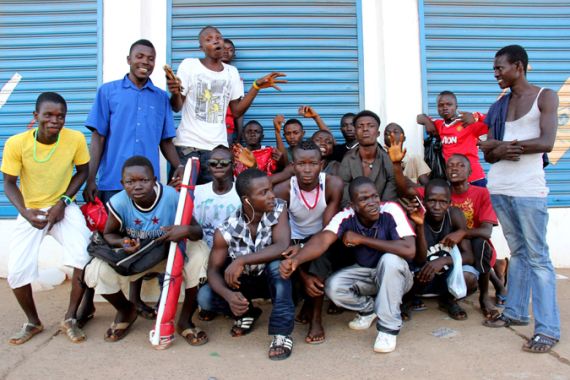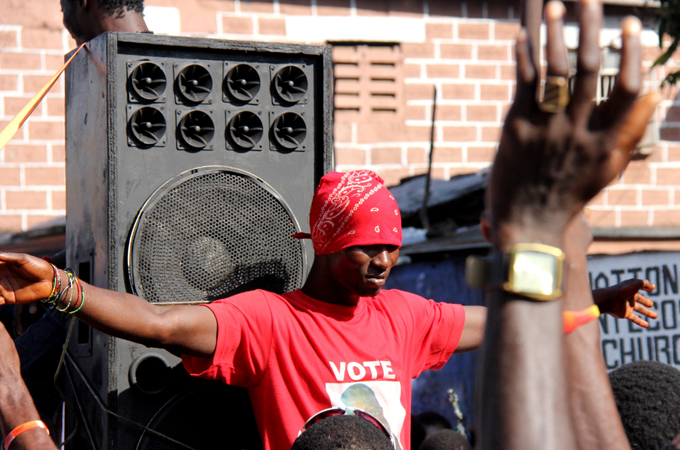Youths used as ‘pawns’ in Sierra Leone polls
With elections two weeks away, pro-government youths are accused of receiving money to harass political rivals.

Freetown, Sierra Leone – At the edge of a rally for Sierra Leone’s largest opposition party, a group of teenagers harassed people exiting taxis on their way to the march.
The youths shouted slogans in support of the ruling All People’s Congress (APC) and attempted to block their rivals’ way.
Mohamed Kaigbo, an 18-year-old dressed in the APC’s colours of red and white, said that all of his friends are planning to vote for President Ernest Bai Koroma when the election is held on November 17.
“We have light, water, and all these things that APC brought us,” Kaigbo continued. “We like APC. They take care of us.” The young man also said that he expects to receive SL$80,000 ($18) for each political rally he attends ahead of the vote.
Kaigbo explained that money, food, and alcohol, are provided by a local representative of the APC; in exchange, he ensures that his group of friends make a public show of their support.
Youths play one of the most-visible roles in Sierra Leone political campaigns. They run at the front of parades, host concerts where crowds dance to party anthems, and this year, took the lead in voter registration drives. They’re also widely blamed for violence during election seasons.
Youths throwing stones
On October 27, ten people were injured in what the opposition Sierra Leone People’s Party (SLPP) described as APC youths throwing stones. The incident occurred in the diamond-rich area of Kono, a key swing district. The SLPP has also claimed that APC supporters stabbed two of its members in Freetown, the capital, as they made their way home from another party function held on the same day.
|
“Youths have always been used, they give them drugs, give them alcohol, and organise them to perpetrate violence, to disturb the election process. The purpose is to benefit political parties “ – Barrie Abubakarr |
The European Union Election Observation Mission in Sierra Leone has identified possible violence as stakeholders’ ‘”main concern” threatening the electoral process. Advocates for youth argue that young people are not at fault. They maintain that political elites take advantage of a marginalised segment of society struggling with high rates of unemployment and poverty.
A decade after the end of a civil war that attracted international attention for its proliferation of child soldiers, Sierra Leone’s youth remain vulnerable.
A 2010 government report states that 70 per cent of youths are unemployed or underemployed and 50 per cent are illiterate and unskilled. The document notes that these conditions mean youth are prone to engaging in political violence.
“Youths have always been used,” said Barrie Abubakarr, national program coordinator for Africa Youth for Peace and Development (Sierra Leone). “They give them drugs, give them alcohol, and organise them to perpetrate violence, to disturb the election process. The purpose is to benefit political parties.”
Abubakarr argued that once youths have played their part for the campaigns, they are forgotten and receive little attention from the state. “It is a clear manipulation,” he said.
‘Potent force’
Sierra Leone has a long history of youths’ involvement in election-related violence.
An April 2011 report by the Africa Research Institute (ARI) states that since independence in 1961, every major political contest in the country has been marred by some level of hostility. “Youth groups have become a more potent force in Sierra Leone’s elections than ethnicity or regionalism,” the document reads. “Young men are brought into the party youth wings – for token payments or promises of future benefits – to intimidate voters and break up opposition rallies.”
The ARI report notes that during the 2007 presidential election – just five years after the end of the civil war – political parties including the APC used “high profile ex-combatants” to fill the ranks of personal security units. Campaigns became so violent that the vote was nearly suspended and a state of emergency declared.
More recently, in March 2009, five days of clashes between supporters of the two main parties climaxed with an attack on the SLPP’s headquarters in Freetown. And in September 2011, SLPP presidential candidate Julius Maada Bio suffered a head injury in an assault allegedly made by APC supporters; tit-for-tat violence followed.
A public inquiry into the latter episode found that attacks were not spontaneous but premeditated and orchestrated by a small group of individuals.
 |
| Young Sierra Leoneans at a traditional festival sponsored by the APC [Travis Lupick/ Al Jazeera] |
Efforts are underway to promote youths’ peaceful participation in campaigns. There have been “no nonsense” carnivals and concerts aimed at bringing together young people from all political parties. And on October 23, an NGO called Restless Development launched a “Youth Manifesto,” which presents the views of young people and seeks to counter a “negative discourse around youth and governance”.
Thea Lacey, partnership manager at Restless Development, said that their research found a high level of enthusiasm for the election, but a lack of political awareness and meaningful participation.
She noted that while 93 per cent of eligible youths surveyed reported to have registered to vote, only 23 per cent were aware of policies influencing their wellbeing. When the study was conducted in 2011, 75 per cent of those who intended to vote had already decided who they would support. Lacey said that many young people feel their views are not taken into account. When politicians do engage with them, she said, it’s often only for partisan gains.
“A lot of people are saying that they feel politicians have historically, and continue to, use young people in a negative way,” she said. “Groups of young people…are basically formed into mobs. And I think people very-much assume that that is still a risk.”
Representatives for the two leading parties rejected responsibility for violence attributed to youth.
Violence-free election
Sulaiman Tejan-Sie, secretary general for the SLPP, said that every Sierra Leonean is asking for a violence-free election, and that is what the SLPP will do its part to deliver. He criticised the ruling APC for allegedly continuing to bribe young people for their support.
“That is what the party in power is known for, giving kids handouts like t-shirts and money for votes,” Tejan-Sie argued. “We say ‘no.’ We believe in giving them a hand up.”
Peter Mansaray, executive secretary for the APC’s Youth League, acknowledged that some perceptions of young people as political actors are not positive. “Youths have, over the years, been used as political tools, as perpetrators,” he said. “Ironically, they have been the victims of this.”
According to Mansaray, the APC is making concerted efforts to improve youth’s role in government. For the 2012 election, the APC aimed for 10 per cent of its candidates to be men and women aged 18-35, he said, claiming the party exceeded its goal by a wide margin.
Sitting on the outskirts of a traditional festival sponsored by the APC, Eniel Kamara, a youth programmes coordinator for a group called the Hermad Foundation, said little would change for youth, regardless of who wins the November 17 vote.
Down the street, thousands of young men and women draped in the APC’s red and white drank alcohol and danced to songs calling for a second term for President Koroma.
“At the end of the day, when one of these two parties comes into power, the youths will not have a voice,” Kamara said. “The same thing happened in 2007. The same youths came out in large numbers for the past government and since then, they haven’t benefited in any way. Nothing for the youth.”
Follow Travis Lupick on Twitter: @tlupick